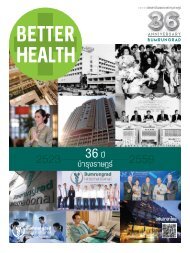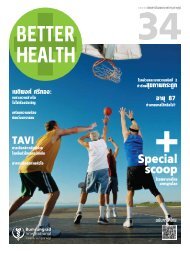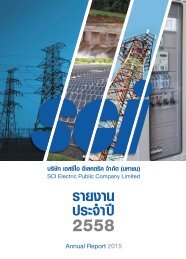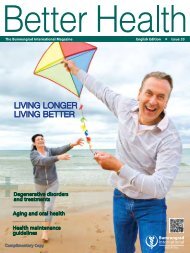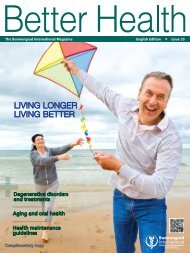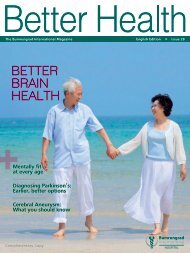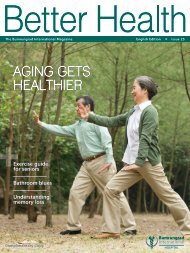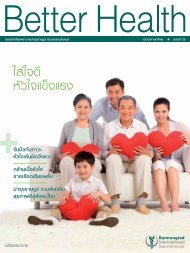Better Health 34 ENG
The magazine for patients and friends of Bumrungrad International Hospital, Thailand.
The magazine for patients and friends of Bumrungrad International Hospital, Thailand.
Create successful ePaper yourself
Turn your PDF publications into a flip-book with our unique Google optimized e-Paper software.
Dr. Verapan Kuansongtham,<br />
Surgeon specializing in Spine Surgery<br />
and Neurosurgery<br />
Upon graduation from the Faculty<br />
of Medicine, Ramathibodi Hospital,<br />
Mahidol University, in the field of<br />
Neurosurgery, Dr. Verapan pursued<br />
further study in Minimally Invasive<br />
Brain and Spine Surgery in Germany<br />
and the United States. Subsequently,<br />
he returned to teach at the Faculty<br />
of Medicine, Ramathibodi Hospital,<br />
Mahidol University – a position he<br />
still holds. He is the founder of the<br />
Spine Institute at Bumrungrad International<br />
Hospital, providing treatment<br />
and care to thousands of patients with<br />
back and neck pain.<br />
What sparked your interest<br />
in Spine Surgery?<br />
My personal experience of having<br />
had back surgery due to a herniated<br />
disc made me truly understand how<br />
patients feel. At that time in 2007, despite<br />
it being microscopic surgery, the size<br />
of the incision was 7.5 centimeters.<br />
I later learned of a spinal surgery<br />
technique developed in Germany that<br />
reduces the incision to only seven<br />
millimeters. I was so impressed that<br />
I expanded my interest from brain<br />
surgery to minimally invasive spine<br />
surgery as well.<br />
Bumrungrad features a dedicated<br />
Spine Institute, with state-of-the-art<br />
facilities offering our patients a high<br />
quality of care as well as conducting<br />
research and education. Through this<br />
collaboration of expertise, the Spine<br />
Institute makes it possible for us to<br />
provide the most up-to-date treatment<br />
to our patients.<br />
What’s it like working at<br />
Bumrungrad?<br />
I admire Bumrungrad for placing<br />
importance on both teaching and<br />
research. In conjunction with hospitals<br />
from Germany, we’ve provided training<br />
courses in endoscopic surgery for<br />
surgeons from different countries<br />
worldwide, for over eight consecutive<br />
years. The training is held once a<br />
year in Thailand, and twice a year<br />
in Germany, welcoming physicians<br />
from all over the world to join in.<br />
Hundreds of Thai physicians have<br />
been trained at our institute, organized<br />
with support from Bumrungrad.<br />
Dr. Thanyalak Chaiseri,<br />
Physician specializing in Cardiology<br />
For over 30 years, Dr. Thanyalak<br />
has helped many patients with heart<br />
diseases improve their quality of life.<br />
After graduating in Medicine first in her<br />
class with honors from Chulalongkorn<br />
University, she studied Cardiac Medicine<br />
at Ramathibodi Hospital.<br />
What was your most<br />
challenging case?<br />
My most challenging case was a<br />
patient who had cyanotic complex<br />
congenital heart disease. Normally,<br />
for young patients, most symptoms<br />
could be properly controlled with<br />
medication. But as people age, the<br />
conditions of existing heart disease<br />
have a cumulative effect on the function<br />
of both the lungs and heart. This patient<br />
also had developed thyrotoxicosis,<br />
which caused complications and<br />
directly affected cardiac function. There<br />
was backflow of venous blood from<br />
the right heart chamber through the<br />
septal defect that caused the venous<br />
blood to mix with the arterial blood in the<br />
left chamber. The arterial oxygen level<br />
dropped far below the normal range,<br />
and that led to cyanosis and marked<br />
exhaustion. As a result, the patient was<br />
unable to perform any normal life<br />
activities and was bed-ridden and fully<br />
dependent on oxygen for support of life.<br />
This patient was treated in our<br />
cardiac care unit, where our full team<br />
of specialists provided tertiary care<br />
until the severe cardiac failure was<br />
improved and her condition was safe<br />
enough for surgical correction. This kind<br />
of cardiac surgery specifically required<br />
specialized cardiac surgeons. Happily, the<br />
patient had a successful operation with<br />
excellent results. The patient regained<br />
a good quality of life and could finally<br />
return to work, travel abroad, and live<br />
a normal life. This outcome was beyond<br />
the expectations of the patient and<br />
the family prior to treatment.<br />
What is the most impressive<br />
treatment you have performed?<br />
I have worked with Bumrungrad<br />
International Hospital for over 25 years<br />
and have successfully treated a great<br />
number of heart-disease patients.<br />
One was a female patient who had<br />
severe valvular endocarditis and was<br />
transferred to Bumrungrad from another<br />
hospital, as her condition continually<br />
worsened. She finally had surgery for a<br />
prosthetic heart valve replacement, and<br />
she regained normal heart function<br />
and overall health. For twenty years after<br />
her treatment, this patient had led a<br />
life without limitations. Every time she<br />
traveled abroad, she would buy me<br />
agift – so often that I had to ask her to<br />
stop. She once asked permission to hug<br />
me, as a token of her appreciation and<br />
said that she would never forget that it<br />
was me who saved her life and continues<br />
to take care of her to this day. I am truly<br />
honored that she put her life in my<br />
hands, and had complete trust in me.<br />
21



